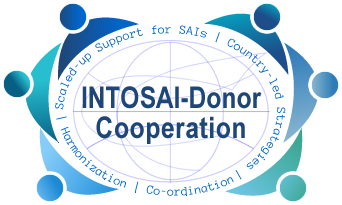Evaluation of Implementation of the GCP Tier 2 strategy
Within the evaluation of IDI’s Bilateral Support 2017-2020, the implementation of the GCP Tier 2 strategy was assessed. The evaluators suggested a series of recommendations, while as a main conclusion they stated that GCP Tier 2 was a relevant and effective response to kick-start capacity development support in SAIs in challenging environments, considered at risk of getting left behind. It could be replicated with two adjustments: (1) The process should aim at selecting 1-2 SAIs in each region and (2) the likelihood of SAI reform should be included among the criteria. The SAIs are leading the reform process. Some SAIs face challenges in getting their Project Support Groups off the ground and effectively functioning. These recommendations are being considered in the second round with the GSAI initative. To read the full report click here.
Independent Evaluation 2018
This Review of the INTOSAI-Donor Cooperation was commissioned by the INTOSAI-Development Initiative (IDI) on 20 April 2018 to the Swedish company Professional Management Arne & Barbro Svensson AB. The team for the Review consists of Dr. Tony Bennett (team leader), Mr. Arne Svensson (senior evaluator) and Ms. Lina Lenefors (internal quality assurance). The evaluation was conducted through desk study and interviews with internal and external stakeholders.
The review concluded that the INTOSAI-Donor Cooperation had fully complied with the commitments made by the INTOSAI-Donor Steering Committee following the 2015 evaluation, however it noted that there remained room for improvement. A series of recommendations covering all activities of the Cooperation was provided. The full report can be accessed below.
Independent Evaluation 2015
Five years after the start of the INTOSAI-Donor Cooperation (hereafter referred to as the Cooperation) an independent evaluation of theinitiative was launched. The evaluation was meant to serve as an evidence base to inform and improve the future design of the Cooperation and the decision-making process related to it.
ECORYS, a consulting company based in Rotterdam, The Netherlands, was responsible for the implementation of the evaluation. Given the relatively short duration of the Cooperation (5 years), the evaluation had a strong focus on learning. The methodological approach of the evaluation consisted of desk study, in-country research in four countries, and interviews and a survey with stakeholders.
The evaluation concluded that the Cooperation is relevant as SAIs in developing countries have an important role to play and their capacities need further enhancement. While it is still too early for firm conclusions regarding the overall effectiveness of the Cooperation, there is evidence of positive changes in behavior both among SAIs and donors; there is more demand-driven support based on strategic plans, better coordination among donors, and better use of peer-to-peer support. However, there is also room for improvement: donors can better coordinate their support and policy dialogue and improve their internal communications, and SAIs can pay more attention to complementarity of support and better linking of various types of support.
The approved final evaluation report (available below) was presented as an input for discussion and decision-making at the meeting of the Steering Committee of the INTOSAI-Donor Cooperation held in October 2015 in Brasilia.
